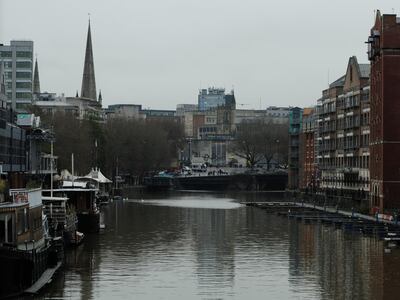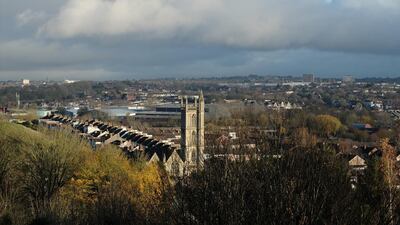Senior Conservative figures close to UK Prime Minister Boris Johnson on Thursday played down a YouGov survey that predicted the party would win 359 seats, a majority of 68, in two weeks.
The reason lies in seats such as Bristol North West, where the Conservatives appear to be losing ground to the Labour opposition.
In all but three of the UK’s general elections since 1959, the party that won the marginal seat has gone on to form a government. Despite a surge in the polls, it lies beyond Mr Johnson's grasp.
On the face of it, the leafy, affluent city seat should be easily poached by the Tories, who speak of aspiration and lower taxes.
It was lost by the Conservatives in 2017 during former prime minister Theresa May’s ill-fated bid to increase her own majority.
While the Labour Party majority is razor-thin at slightly more than 4,000 votes, surveys show it is well ahead in Bristol.
"We've mobilised a big group who are all passionate about campaigning," Molly Russell-Davies, vice president of the Labour Society at Bristol University of West England, told The National.
“We're out canvassing every day and are so lucky to have such a fantastic and committed group of Labour students at the university."
The Wednesday YouGov poll for The Times showed all four of Bristol's seats would stick with Labour.
It showed the incumbent, Labour’s Darren Jones, winning 47 per cent of the vote, beating second-placed Conservative candidate Mark Weston by eight points.
The politics of Brexit have so altered the political landscape that party insiders do not trust the polls and once reliable bastions of support are no longer winnable.
Mr Johnson’s former chief of staff, Dominic Cummings, warned late on Wednesday that a hung parliament was “a very real possibility”.

Mr Cummings, the man behind Vote Leave drive in 2016 to take Britain out of the EU, left the prime minister’s team when Parliament was dissolved.
In a blog post described as a “bat signal” sent out because Brexit was in danger, Mr Cummings outlined his concerns that the electoral contest was much closer than polls indicated.
The highly anticipated YouGov poll, which accurately predicted the result of the 2017 election, showed that in at least 30 of the seats predicted to go to the Conservatives, the projected margins were below 5 per cent.
Mr Cummings is continuing to lend his support to Mr Johnson’s election campaign, but the Conservative party faces a possible upset from an unlikely source.
The Brexit party could effectively hand Labour leader Jeremy Corbyn the keys to Downing Street if he picked up Conservative votes in marginal seats, Mr Cummings warned.
In 2016, 61 per cent of Bristol North West’s voters came out in support of staying in the EU in 2016.
Mr Jones has taken a strong pro-Remain stance, calling for a second referendum long before it became an official Labour Party policy.
Fears that the Remain Alliance agreement between the Liberal Democrats and the Greens could eat into the slim Labour majority also seem to have been unfounded.
This shows that Labour’s Brexit policy is working well enough to secure the vote from rival parties who have taken a stronger stance on staying in the bloc.
Mr Weston finished runner up to Labour’s Karin Smyth when he stood for Bristol South in 2017.
A vocal critic of the city’s Labour Mayor Marvin Rees, Mr Weston has campaigned on improvements to local transport and delivering on the result of the EU referendum.
Beyond Brexit, Bristol’s large population of students could have a significant role to play in the city’s marginal contests.
More than 50,000 students are enrolled at the city’s two universities, most of whom are likely to vote against the Conservatives in constituencies across Bristol.
David Lindley, a spokesman for Bristol Young Labour, said the party was using youth activism “to sway public opinion and ensure a progressive government comes into office”.

But the timing of the election, after most students have gone home for the holidays, could affect the vote.
Mr Lindley said that the movement of students “works both ways”.
“Many students will also be coming back to marginals such as Bristol’s North West and perhaps could work in Labour’s favour,” he said.
Mr Johnson's trip to the region this month was the cause of some embarrassment after he was forced to cancel a stop at a bakery in Glastonbury after more than 100 people turned out to protest against his visit.
He also became stuck in Bristol’s notorious rush-hour traffic on his way to an appearance at a local radio station.


